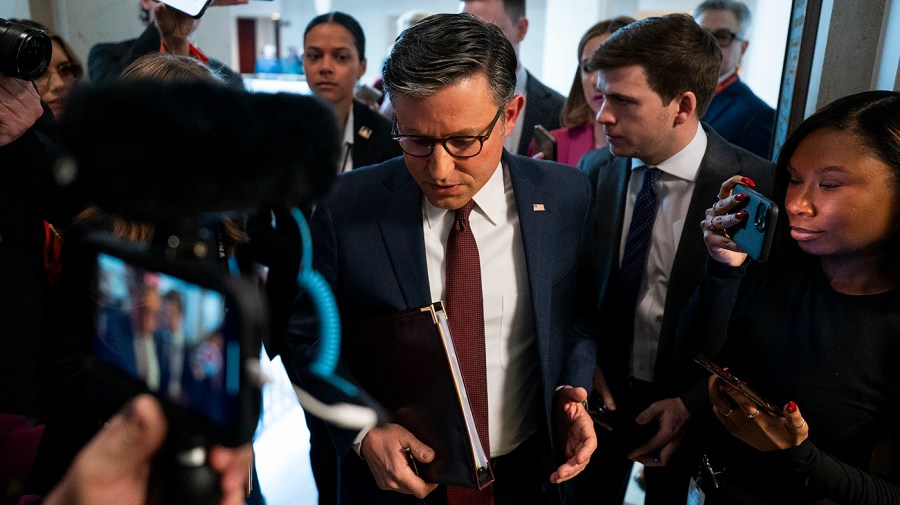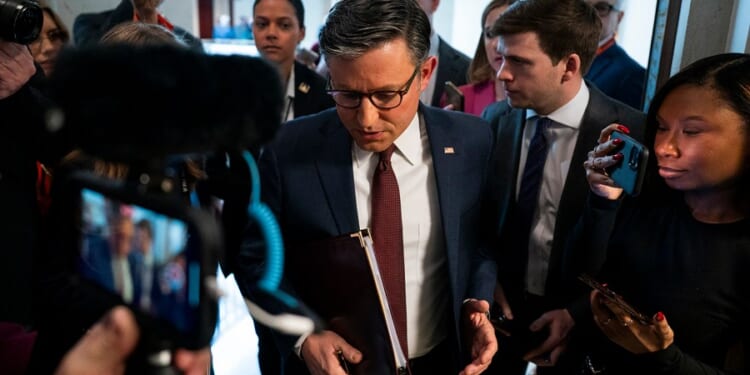
The House GOP’s budget resolution is on thin ice as conservative budget hawks dig in on their opposition, threatening to derail Speaker Mike Johnson’s (R-La.) plans to bring the legislation up for a vote on Tuesday.
At least four Republicans — Reps. Thomas Massie (Ky.), Victoria Spartz (Ind.), Warren Davidson (Ohio) and Tim Burchett (Tenn.) — said they plan to vote against the measure when it hits the floor Tuesday evening, airing gripes related to spending. Burchett said there are at least five opponents, signaling that the resistance is larger behind the scenes.
The hardened opposition has already prompted leadership to change its projections for a vote. After announcing Monday night that the House would vote on the budget resolution on Tuesday night, Johnson opened the door to delaying that timeline.
“There may be a vote tonight, may not be,” he said at a press conference Tuesday morning. “Stay tuned.”
“That’s why you get paid and hang around here, you have lots to report on,” he added.
The budget resolution would set the stage for House Republicans to pass a sprawling bill full of Trump’s domestic policy priorities, including border funding, energy policy and tax cuts.
Johnson, however, has little room for error. Republicans can only afford to lose one GOP vote and still adopt the resolution, assuming full attendance and complete Democratic opposition. Attendance on both sides of the aisle was unclear early on Tuesday.
In a positive development for Johnson, leadership appeared to make some progress with moderate Republicans who have expressed hesitation about the resolution, primarily over expected cuts to Medicaid. A handful of centrists huddled with Johnson in his office late Monday night.
“I’m in a better place [than] where I was yesterday,” said Rep. Juan Ciscomani (R-Ariz.), who last week signed on to a letter with Congressional Hispanic Conference members expressing concerns about potential changes to Medicaid and other programs.
Medicaid cuts have been a significant flashpoint throughout the budget resolution deliberations, with moderates concerned that the conference may gut the social safety net program to reach the $880 billion minimum of spending cuts the Energy and Commerce Committee has been directed to find — a reality that some lawmakers have publicly acknowledged.
Leadership, however, is downplaying any potential changes to Medicaid ahead of the vote on the framework. House Majority Leader Steve Scalise (R-La.) held up a paper copy of the resolution in a press conference and said: “There is no Medicaid in this bill. There are no Medicaid cuts in this bill.”
Pressed on whether he can guarantee there won’t be cuts to Medicaid, Johnson said that the program is “hugely problematic because it has a lot of fraud, waste, abuse.”
“That’s what we’re about, and that’s what you’re going to see happen,” the Speaker added, saying Republicans want to ensure migrants in the country illegally do not get Medicaid benefits.
Still at least two budget hawks are digging in on their opposition — and signaling that they will not waver from that position — which is enough resistance to tank the bill.
“I was a lean no before this meeting, now I’m a no,” Massie told reporters after leaving the House GOP conference’s gathering Tuesday morning, pointing to a fact sheet from leadership and arguing that the measure will add to the deficit.
“If the Republican plan passes under the rosiest assumptions, which aren’t even true, we’re gonna add $328 billion to the deficit this year, we’re gonna add $295 billion to the deficit the year after that, and $242 billion to the deficit after that, under the rosiest assumptions,” Massie added. “Why would I vote for that?”
Rep. Victoria Spartz (R-Ind.), who announced her opposition to the resolution over the weekend, re-upped that position Tuesday morning, arguing that the budget resolution does not do enough to rein in deficit spending.
“We have a baseline that includes $3.5 trillion, and we’re only committing to really $150 billion,” she said. “It’s just really sad.”
The Indiana Republican — who is known to flip-flop stances on high-stakes votes — dismissed any notion that she would change her position, suggesting that she was dug in on the opposition.
“I don’t change my vote if things don’t change,” Spartz said. “I don’t think you guys get right memo. I never change my vote without changes in the rules or changes in procedures.”
Members of the House Freedom Caucus, who are normally part of a cadre of hardliners opposing legislation over fiscal matters, meanwhile, are supportive of the resolution after they secured key changes ahead of a committee vote earlier this month. But with the thin GOP margin, other fiscal hawks can easily threaten the vote.
House GOP leadership is racing to adopt its budget resolution as it seeks to keep pace with its ambitious timeline to pass Trump’s domestic policy agenda. Republicans are looking to use the budget reconciliation process to achieve that goal which would allow the party to circumvent Democratic opposition in the Senate.
Republicans, however, must first adopt a budget resolution to set that process in motion. Johnson has said he wants to move the budget resolution out of the chamber by the end of this month.
The resolution lays out a $1.5 trillion floor for spending cuts across committees with a target of $2 trillion, puts a $4.5 trillion ceiling on the deficit impact of any GOP plan to extend Trump’s 2017 tax cuts, and includes $300 billion in additional spending for the border and defense and a $4 trillion debt limit increase.
Tucked inside the resolution is a directive for the Energy and Commerce Committee to find at least $880 billion in deficit reductions, which some say will necessitate changes to Medicaid — a notion that sparked widespread concerns among moderates.
While the measure does not directly call for cuts to Medicaid a number of lawmakers have argued that the $880 billion number cannot be reached without significant slashes to Medicaid. Republicans have been publicly talking for weeks about offsetting the cost of tax cuts and other priorities with adjustments to Medicaid.
Members leaving the House GOP Conference meeting, however, Tuesday morning echoed a key talking point from leadership: That the resolution is simply the framework for the Trump agenda bill, and does not include the final details.
“It’s just a starting point,” said Rep. Nick LaLota (R-N.Y.).
While Massie and Spartz signaled firm opposition to the budget resolution, Burchett and Davidson suggested that they could be convinced to get on board.
When asked if there was any path for leadership to gain his support, Davidson said “they could communicate a binding plan for discretionary spending ahead of March 14,” pointing to the looming government funding deadline. He said he wants the budget resolution and government funding plan to reduce spending, and would like to see the slashes outlined by the Department of Government Efficiency (DOGE) locked in by Congress.
“I want a plan that, when you put the whole spending together it actually spends less money. We’re seeing part of the plan with the budget resolution, we’re not seeing the whole plan,” Davidson said. “If Congress doesn’t lock in in funding some measure of all these things that DOGE is outlining, the administration’s gonna keep losing in court.”
Burchett, meanwhile, said he just needs some “verbal” assurances that GOP leaders are committed to reining in deficits in real numbers.
“I’d just like to have some confirmation that we’re going to make some changes,” he said. “We don’t honor what we write down anyway. Come on. This is Washington. They don’t honor anything.”
Like the other conservative holdouts, the Tennessee Republican said his chief concern is that the GOP budget will spike the nation’s deficit spending in the name of cutting it. He’s accusing Republican leaders of fudging the numbers to claim savings where there is none.
“We promised the people we’re gonna have cuts, and then we’re just gonna turn right around and spend the money at the Pentagon. The war pimps will get theirs no matter what anyway,” Burchett said. “And President Trump is talking about permanent tax cuts — I don’t think they’re in there. And they talk about all [these] DOGE cuts — which are great, and America loves — but what they don’t realize is they’re just going to tack ‘em right back on to the money we saved, that we’re borrowing.”
Burchett blasted the GOP’s proposed cuts as insufficient to rein in deficits, and he dismissed the Republicans’ growth projections stemming from tax cuts as unrealistic “Washington talk.”












